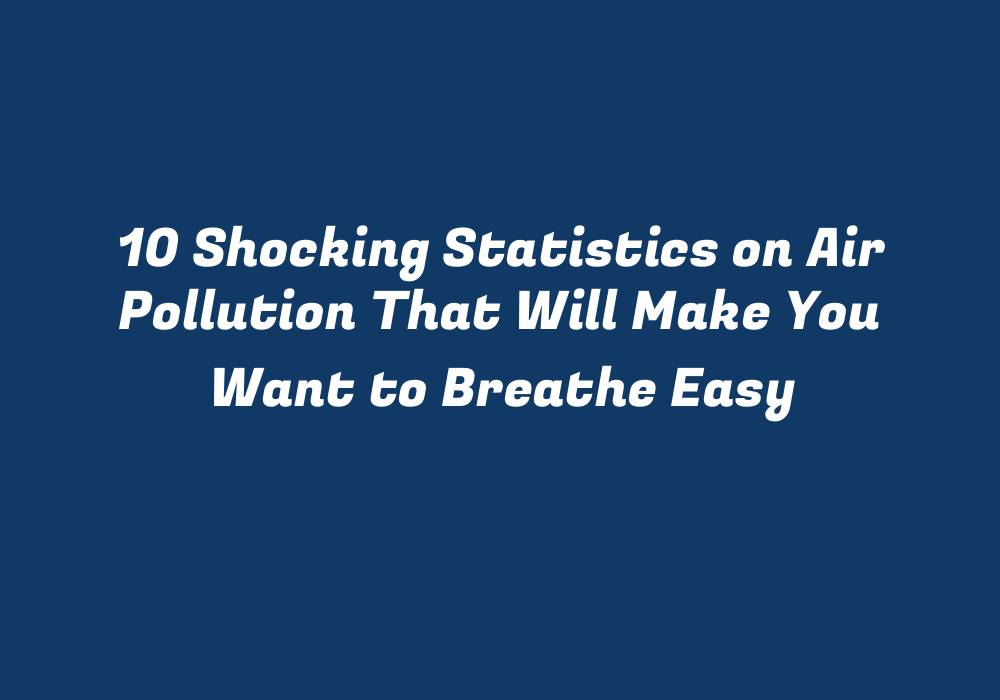10 Shocking Statistics on Air Pollution That Will Make You Want to Breathe Easy
Air pollution is a prevalent problem that affects the environment and human health, but many people are not fully aware of its severity. This issue goes beyond just causing discomfort – it impacts global warming, public health, and overall quality of life. To better understand its extent and consequences, let’s explore 10 shocking statistics on air pollution that will make you want to breathe easier.
1. Air Pollution Causes Approximately 7 Million Deaths Annually
According to the World Health Organization (WHO), nearly 7 million people die each year due to air pollution-related causes. This is a staggering number considering that many of these deaths could have been prevented with better management and regulation of emissions. It’s time we take steps towards cleaner air for everyone, not just to live longer but also to maintain good health.
2. Air Pollution Disproportionately Affects Vulnerable Populations
Children, the elderly, and those with existing respiratory conditions are among the most vulnerable groups affected by air pollution. Studies show that exposure to polluted air can result in lower lung function, decreased cognitive ability, and an increased risk of developing chronic diseases such as asthma and heart ailments. To protect these populations, we must work towards reducing air pollution in their environments.
3. Outdoor Pollution Has Become A Global Concern
Although many people believe that indoor pollution is the primary source of harm, outdoor air pollution has become just as concerning. According to the International Energy Agency (IEA), outdoor air pollution is responsible for up to 4.5 million premature deaths annually – a number that rivals those linked to smoking-related illnesses. This highlights the urgent need to reduce emissions and promote cleaner energy alternatives.
4. Particulate Matter, A Major Component of Air Pollution, Can Affect Brain Function
Particulate matter (PM) is a type of air pollutant that can penetrate deep into the lungs and even enter the bloodstream, leading to potential health risks. According to recent studies, long-term exposure to PM2.5 (fine particulate matter) can impact brain function, memory, and cognitive performance – all factors essential for daily functioning.
5. Air Pollution Contributes to Global Warming
Air pollution is not only harmful to human health but also contributes to climate change. Emissions released into the atmosphere contribute to increased greenhouse gas concentrations, which in turn trap heat and cause global warming. By reducing air pollutants, we can mitigate the effects of climate change and preserve our environment for future generations.
6. Air Pollution Disproportionately Affects Low-Income Communities
Low-income communities are more likely to be situated near pollution sources, such as industrial facilities or highways. This exposure can lead to a higher prevalence of respiratory illnesses and other health issues compared to wealthier communities with better environmental protections. Efforts must be made to address air quality in these areas to alleviate the health disparities faced by those who live there.
7. Air Pollution Causes Significant Environmental Damage
Air pollution not only impacts human health but also degrades ecosystems and contributes to environmental damage. Acid rain, smog formation, and soil degradation are just a few examples of the long-lasting effects that air pollutants can have on nature. By working towards cleaner air, we can protect the environment for future generations.
8. Air Pollution Can Impact Our Food Supply
Air pollution affects not only humans but also our food supply by depleting crop yields and impairing plant growth. This in turn leads to decreased agricultural productivity, which can impact global food security. By addressing air pollution, we can help ensure a sustainable food supply for all.
9. Air Pollution Can Harm Pregnant Women and Their Babies
Exposure to polluted air during pregnancy has been linked to various health issues, such as low birth weight, developmental problems in newborns, and preterm delivery. By reducing air pollution, we can help ensure a healthier start for future generations of children.
10. Air Pollution Can Be Reduced Through Collective Action
Although the statistics on air pollution are shocking, it’s essential to remember that we are not powerless in addressing this issue. By advocating for cleaner energy sources, supporting stricter emission regulations, and taking individual actions like reducing our car use and choosing low-pollution alternatives, we can work together towards a healthier environment for everyone to breathe easily.
In conclusion, the 10 shocking statistics on air pollution presented here underscore the severity of this issue and its consequences on human life, environmental health, and global wellbeing. By raising awareness and taking action to reduce emissions, we can make a meaningful difference in our own lives and create a better future for generations to come.
